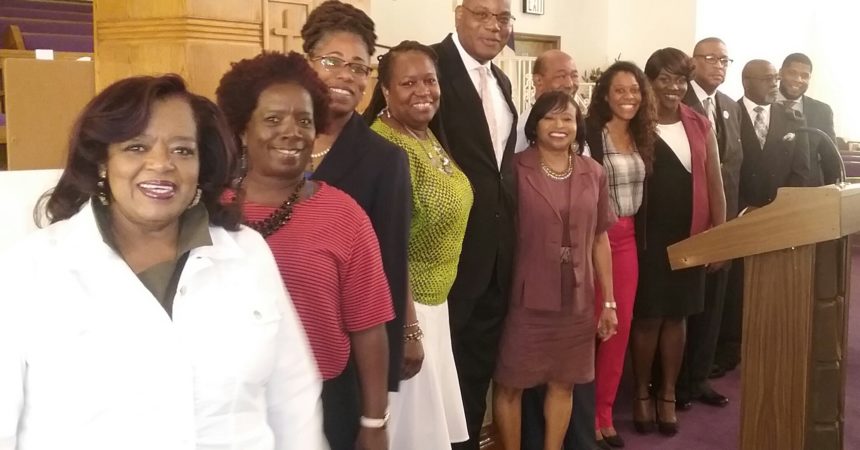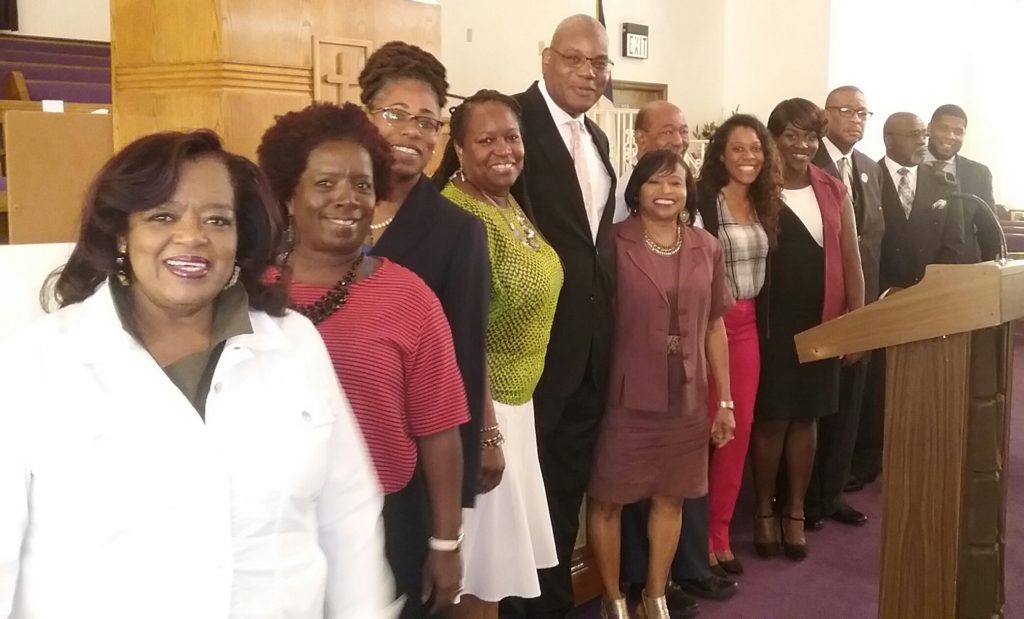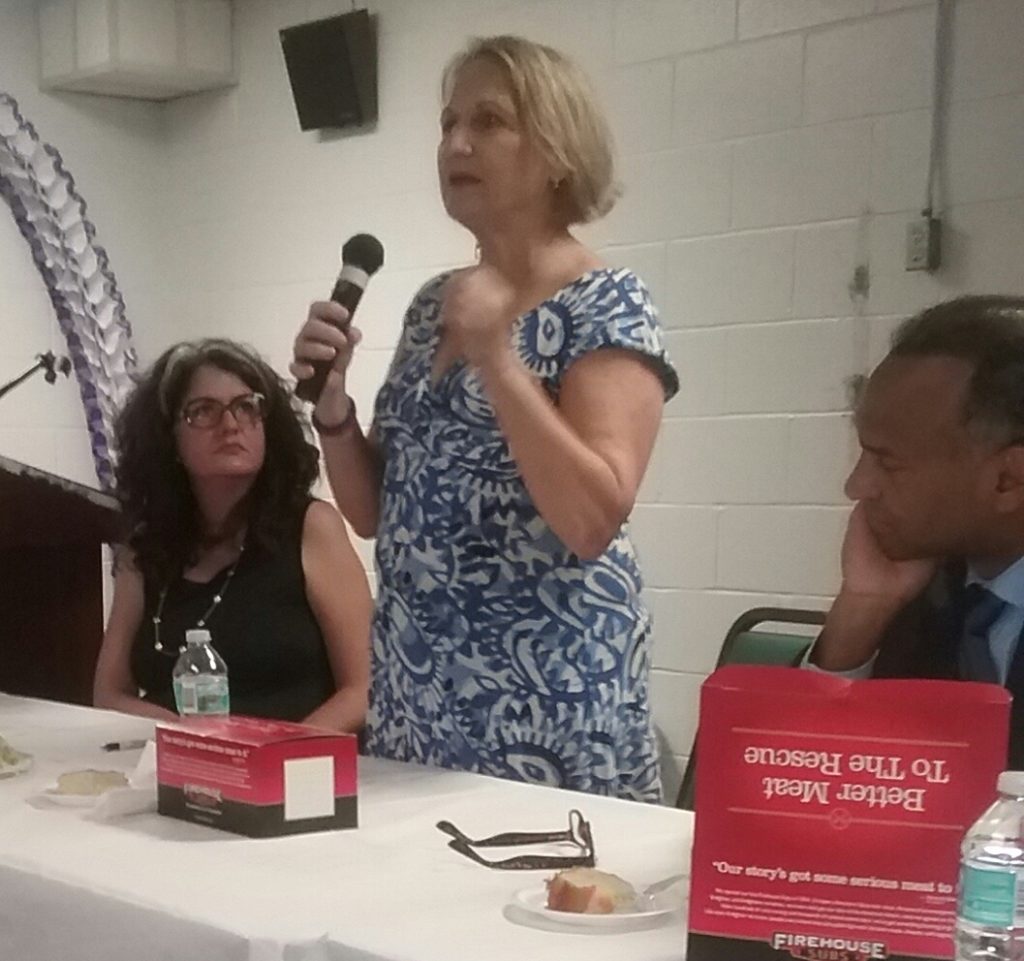
Forum answers plenty of questions on immigration

A group from Bethel Missionary Baptist’s congregation was organized to plan Sunday’s forum.
Photo by St. Clair Murraine
By St. Clair Murraine
Outlook staff writer

Theresa Leslie stands to make a point about refugees who live in Tallahassee.
Photo by St. Clair Murraine
Attorney Neil Rambana has seen the scenario play out so many times in an immigration court.
The undocumented immigrant parent of an American-born child fights to stay in the country. The parent loses the argument and is immediately deported.
If there isn’t a relative to raise the child, foster care steps in and the child is left without a guardian with biological ties.
“Just like that,” said Rambana, who handles immigration deportation cases. “There is no right for that child to go back with the parents.”
Rambana, his wife, and Attorney Elizabeth Ricci and Theresa Leslie spent about an hour Sunday in a forum discussion about immigration laws. Leslie is a Refugee Services Community Liaison for the Department of Children and Families.
Civil rights attorney Benjamin Crump also weighed in during the conversation.
They focused on legal definition of an immigrant, what are refugees, Deferred Action for Childhood Arrivals or DACA, the meaning of “anchor baby” and other commonly used terms such as “getting in line” and “dry foot, wet foot”.
The forum was held at Bethel Missionary Baptist Church, where its pastor R.B. Holmes preached on the topic earlier. Bethel organized the forum to help its congregation better understand changes in immigration laws that could affect the lives of more than one million people.
Most of the informative session was spent discussing the fairness of immigration laws and who they apply to. Recent changes to immigration laws that could disrupt families were the impetus for the forum, Holmes said.
Ricci gave some perspective on the number of immigrants living in the U.S. Data shows that 40 percent of immigrants are relatives of U.S. citizens, 25 percent are on family sponsorship and 15 percent are based on employment, 15 percent are refugees through asylum, while 5 percent are in the country through a diversity lottery.
Holmes also expressed concern over the divide that the recent laws signed by Pres. Donald Trump are causing across the country. One of the biggest issues is a claim that immigrants are taking jobs from Americans.
However, Ricci said that is not the problem.
“It’s the unscrupulous American employers who are at fault,” she said, adding that immigrants, especially those who are undocumented, often work for pay well below the minimum wage.
Ricci also said that labeling undocumented foreigners as criminals is unfair because those in the country illegally don’t violate federal laws.
About an hour before the discussion, Holmes beseeched his congregation to embrace foreigners. But seemingly not everyone who heard his sermon might be willing to do so.
Osiefield Anderson, a math professor at FAMU, questioned the push to encourage immigrants. He used the hypothetical of a family that might be down on its luck and turn to another family. Eventually both families could be in a bad place, Anderson contends.
“We just can’t afford to take anybody in this country if it’s going to deteriorate living conditions in this country,” he said. “So I don’t think immigration should be loose otherwise you’ll mess things up.
“You bring people in here and you’re responsible; they’re given a place to stay, food and everything else. I don’t think that should be incumbent on any country to do. I think you have to help people but there is a limit to this kind of thing.”
Ricci responded, saying that mass deportation, especially the estimated 800,000 on the DACA program, could come with a high price tag.
“The economic benefit of legalizing who are here is much more than the cost (of deportation),” she said. “Aside from the humanitarian crisis, the morale crisis of not accepting people who are here.”
Crump also made a case for immigrants, comparing their plight to Blacks in the era of segregation.
“We are still by and large one of the richest countries in the world. The most wealth is being held by 1 percent, while 99 percent all have to grab and fight,” Crump said. “If we made that 1 percent pay their fair share of taxes we won’t have any immigration problem.’
Later, he said it’s a slippery slope because the arguments for civil rights and the rights that immigrants are fighting for are so similar.
“Whether it’s immigration discrimination or denial or civil rights to minorities, there are some arguments that could be made on people who are oppressed that are very similar,” he said. “We have to reject this notion that they’re saying we don’t want more immigrants; we want the white kinds. That’s not right. That’s not American.”







